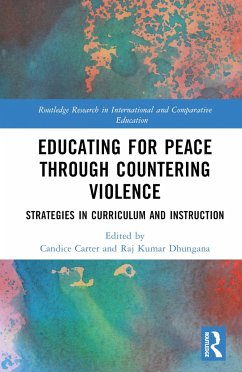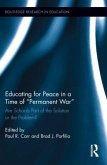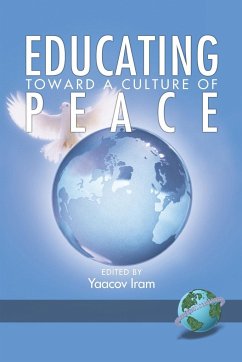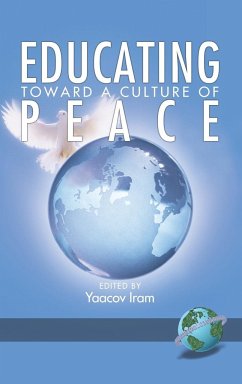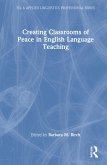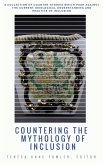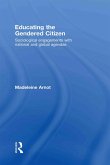Educating for Peace through Countering Violence
Strategies in Curriculum and Instruction
Herausgeber: Carter, Candice; Dhungana, Raj Kumar
Educating for Peace through Countering Violence
Strategies in Curriculum and Instruction
Herausgeber: Carter, Candice; Dhungana, Raj Kumar
- Gebundenes Buch
- Merkliste
- Auf die Merkliste
- Bewerten Bewerten
- Teilen
- Produkt teilen
- Produkterinnerung
- Produkterinnerung
This book advances knowledge about the implementation of peace and non-violence strategies in education that counter violence.
Andere Kunden interessierten sich auch für
![Educating for Peace in a Time of Permanent War Educating for Peace in a Time of Permanent War]() Educating for Peace in a Time of Permanent War238,99 €
Educating for Peace in a Time of Permanent War238,99 €![Disrupting and Countering Deficits in Early Childhood Education Disrupting and Countering Deficits in Early Childhood Education]() Disrupting and Countering Deficits in Early Childhood Education195,99 €
Disrupting and Countering Deficits in Early Childhood Education195,99 €![Educating Toward a Culture of Peace (PB) Educating Toward a Culture of Peace (PB)]() Educating Toward a Culture of Peace (PB)63,99 €
Educating Toward a Culture of Peace (PB)63,99 €![Educating Toward a Culture of Peace (Hc) Educating Toward a Culture of Peace (Hc)]() Educating Toward a Culture of Peace (Hc)107,99 €
Educating Toward a Culture of Peace (Hc)107,99 €![Creating Classrooms of Peace in English Language Teaching Creating Classrooms of Peace in English Language Teaching]() Creating Classrooms of Peace in English Language Teaching195,99 €
Creating Classrooms of Peace in English Language Teaching195,99 €![Countering the Mythology of Inclusion Countering the Mythology of Inclusion]() Countering the Mythology of Inclusion48,99 €
Countering the Mythology of Inclusion48,99 €![Educating the Gendered Citizen Educating the Gendered Citizen]() Madeleine ArnotEducating the Gendered Citizen206,99 €
Madeleine ArnotEducating the Gendered Citizen206,99 €-
-
-
This book advances knowledge about the implementation of peace and non-violence strategies in education that counter violence.
Hinweis: Dieser Artikel kann nur an eine deutsche Lieferadresse ausgeliefert werden.
Hinweis: Dieser Artikel kann nur an eine deutsche Lieferadresse ausgeliefert werden.
Produktdetails
- Produktdetails
- Verlag: Routledge
- Seitenzahl: 342
- Erscheinungstermin: 8. November 2023
- Englisch
- Abmessung: 235mm x 157mm x 23mm
- Gewicht: 647g
- ISBN-13: 9781032464046
- ISBN-10: 1032464046
- Artikelnr.: 68474344
- Herstellerkennzeichnung
- Libri GmbH
- Europaallee 1
- 36244 Bad Hersfeld
- gpsr@libri.de
- Verlag: Routledge
- Seitenzahl: 342
- Erscheinungstermin: 8. November 2023
- Englisch
- Abmessung: 235mm x 157mm x 23mm
- Gewicht: 647g
- ISBN-13: 9781032464046
- ISBN-10: 1032464046
- Artikelnr.: 68474344
- Herstellerkennzeichnung
- Libri GmbH
- Europaallee 1
- 36244 Bad Hersfeld
- gpsr@libri.de
Candice C. Carter is an educational researcher and consultant based in the USA. Raj Kumar Dhungana is Visiting Faculty at Kathmandu University School of Education, Nepal.
Section I. Violence Responses through Relational and Mindful Education. 1.
Introduction. 2. Imagining Relational Ontologies for Education Amidst
Ricocheting (non) Violence: Notes from Vancouver, Canada. 3. Embodied
Universal Peace: Curriculum Theory and Buddhist Intersubjective
Contemplative Inquiry. Section II: Cross-Cultural Education Countering
Violence. 4. Creating an Intercultural Peace Education Course with High
Ability Teenagers from Different Backgrounds and World Regions. 5.
Utilizing Multicultural Read-Alouds in the USA to Support Empathy
Development. 6. Inter-Religious Dialogue Pedagogy for Teaching Peace
Education in Uganda. 7. Ethnopedagogy: Exploring Peaceful Traditions of
Indonesia's Sundanese Indigenous Communities. Section III: Countering
Violence in Responsive Education. 8. Memorials as Sites for Peace
Education: The John Hope Franklin Reconciliation Park in the USA. 9.
Families' Discourse in Polarized Societies: Talking About Violence with
Their Children in Catalonia. 10. Conflict Coaching in the United Kingdom:
Youth Leading a Transformative Approach to Conflict. 11. Decolonizing an
English as an Additional Language Curriculum: Addressing Cultural Violence
in a Colombian School. 12. A Holistic Approach to Peace Education:
Experiences of Putumayo, Colombia. 13. Adaptive Instruction: Peace
Education in Argentina During a Pandemic. Section IV: Pedagogies of
Transformative Hope. 14. "Engaged Pedagogy for Hope": Dance Instruction to
Heal from Violence in South Africa. 15. Fostering the Hope of Distressed
African Americans in the USA: Culture, Arts, and Youth-Development
Strategies. 16. Conclusion.
Introduction. 2. Imagining Relational Ontologies for Education Amidst
Ricocheting (non) Violence: Notes from Vancouver, Canada. 3. Embodied
Universal Peace: Curriculum Theory and Buddhist Intersubjective
Contemplative Inquiry. Section II: Cross-Cultural Education Countering
Violence. 4. Creating an Intercultural Peace Education Course with High
Ability Teenagers from Different Backgrounds and World Regions. 5.
Utilizing Multicultural Read-Alouds in the USA to Support Empathy
Development. 6. Inter-Religious Dialogue Pedagogy for Teaching Peace
Education in Uganda. 7. Ethnopedagogy: Exploring Peaceful Traditions of
Indonesia's Sundanese Indigenous Communities. Section III: Countering
Violence in Responsive Education. 8. Memorials as Sites for Peace
Education: The John Hope Franklin Reconciliation Park in the USA. 9.
Families' Discourse in Polarized Societies: Talking About Violence with
Their Children in Catalonia. 10. Conflict Coaching in the United Kingdom:
Youth Leading a Transformative Approach to Conflict. 11. Decolonizing an
English as an Additional Language Curriculum: Addressing Cultural Violence
in a Colombian School. 12. A Holistic Approach to Peace Education:
Experiences of Putumayo, Colombia. 13. Adaptive Instruction: Peace
Education in Argentina During a Pandemic. Section IV: Pedagogies of
Transformative Hope. 14. "Engaged Pedagogy for Hope": Dance Instruction to
Heal from Violence in South Africa. 15. Fostering the Hope of Distressed
African Americans in the USA: Culture, Arts, and Youth-Development
Strategies. 16. Conclusion.
Section I. Violence Responses through Relational and Mindful Education. 1.
Introduction. 2. Imagining Relational Ontologies for Education Amidst
Ricocheting (non) Violence: Notes from Vancouver, Canada. 3. Embodied
Universal Peace: Curriculum Theory and Buddhist Intersubjective
Contemplative Inquiry. Section II: Cross-Cultural Education Countering
Violence. 4. Creating an Intercultural Peace Education Course with High
Ability Teenagers from Different Backgrounds and World Regions. 5.
Utilizing Multicultural Read-Alouds in the USA to Support Empathy
Development. 6. Inter-Religious Dialogue Pedagogy for Teaching Peace
Education in Uganda. 7. Ethnopedagogy: Exploring Peaceful Traditions of
Indonesia's Sundanese Indigenous Communities. Section III: Countering
Violence in Responsive Education. 8. Memorials as Sites for Peace
Education: The John Hope Franklin Reconciliation Park in the USA. 9.
Families' Discourse in Polarized Societies: Talking About Violence with
Their Children in Catalonia. 10. Conflict Coaching in the United Kingdom:
Youth Leading a Transformative Approach to Conflict. 11. Decolonizing an
English as an Additional Language Curriculum: Addressing Cultural Violence
in a Colombian School. 12. A Holistic Approach to Peace Education:
Experiences of Putumayo, Colombia. 13. Adaptive Instruction: Peace
Education in Argentina During a Pandemic. Section IV: Pedagogies of
Transformative Hope. 14. "Engaged Pedagogy for Hope": Dance Instruction to
Heal from Violence in South Africa. 15. Fostering the Hope of Distressed
African Americans in the USA: Culture, Arts, and Youth-Development
Strategies. 16. Conclusion.
Introduction. 2. Imagining Relational Ontologies for Education Amidst
Ricocheting (non) Violence: Notes from Vancouver, Canada. 3. Embodied
Universal Peace: Curriculum Theory and Buddhist Intersubjective
Contemplative Inquiry. Section II: Cross-Cultural Education Countering
Violence. 4. Creating an Intercultural Peace Education Course with High
Ability Teenagers from Different Backgrounds and World Regions. 5.
Utilizing Multicultural Read-Alouds in the USA to Support Empathy
Development. 6. Inter-Religious Dialogue Pedagogy for Teaching Peace
Education in Uganda. 7. Ethnopedagogy: Exploring Peaceful Traditions of
Indonesia's Sundanese Indigenous Communities. Section III: Countering
Violence in Responsive Education. 8. Memorials as Sites for Peace
Education: The John Hope Franklin Reconciliation Park in the USA. 9.
Families' Discourse in Polarized Societies: Talking About Violence with
Their Children in Catalonia. 10. Conflict Coaching in the United Kingdom:
Youth Leading a Transformative Approach to Conflict. 11. Decolonizing an
English as an Additional Language Curriculum: Addressing Cultural Violence
in a Colombian School. 12. A Holistic Approach to Peace Education:
Experiences of Putumayo, Colombia. 13. Adaptive Instruction: Peace
Education in Argentina During a Pandemic. Section IV: Pedagogies of
Transformative Hope. 14. "Engaged Pedagogy for Hope": Dance Instruction to
Heal from Violence in South Africa. 15. Fostering the Hope of Distressed
African Americans in the USA: Culture, Arts, and Youth-Development
Strategies. 16. Conclusion.

